On May 10, musicians of the Phoenix Symphony, represented by Local 586 (Phoenix, AZ), agreed to a one-year contract that will begin September 1 and run through October 31, 2020. Under the contract, salary will increase from $44,163.98 in the past season to $45,486 in the coming season, and orchestra size will remain at 76 musicians with 10 vacancies. Updates to work rules include limitations on scheduling Saturday rehearsals.
Tag Archives: news
Philadelphia Orchestra Receives $55 Million
The Philadelphia Orchestra has received an anonymous gift that is one of the largest in the history in the orchestra world. The anonymous gift of $55 million was announced by the orchestra at the beginning of June.
The Philadelphia Orchestra plans to use $5 million toward operating expenses, putting the vast majority, $50 million, toward its endowment. That will bring the endowment total to $212 million and will allow the organization to draw $10.8 million from the endowment next year, compared to its $7.9 million draw this year.
The anonymous donor group stated that the gift was “an expression of confidence in the artistic and organizational leadership of the orchestra.” The Philadelphia Orchestra’s musicians are members of Local 77 (Philadelphia, PA).
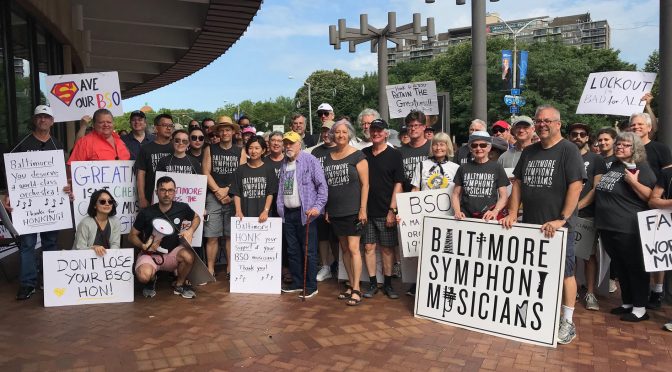
Baltimore Symphony Musicians Locked Out, Summer Season Canceled
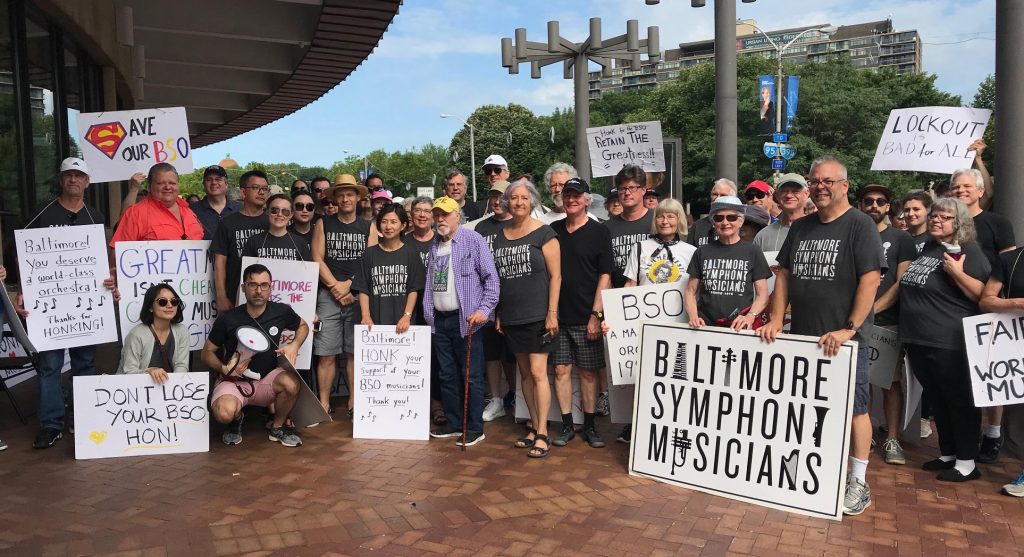
For the first time in three decades, the musicians of the Baltimore Symphony Orchestra (BSO) have been locked out. The news became official June 16, when orchestra management announced that it would be canceling the summer season, suspending musicians’ pay and cutting off their health insurance. At a June 21 bargaining session with BSO management, musicians also learned that their Long-Term Disability coverage was canceled as of June 17, and their life insurance policies would be canceled as of September 1.
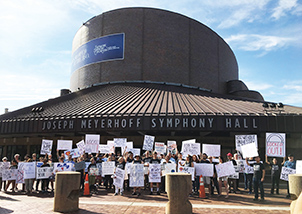
BSO musicians, members of Local 40-543 (Baltimore, MD), have played without a contract since January. Previously, the orchestra board proposed cutting the concert season from 52 weeks to 40, amounting to a loss of 20% in income and benefits for musicians. The lockout, which bars musicians from going to work, effectively achieves that goal.
During the winter, musicians mounted a campaign to raise public awareness of the orchestra’s plight, resulting in the passage of House Bill 1404 by the Maryland General Assembly which includes $3.2 million in funding in support of the BSO.
Releasing the first installment of the two-year grant might have averted the lockout. On May 30, at an urgent session of the bargaining committee, management told musicians it was unlikely Gov. Larry Hogan would make funding immediately available. By the end of the meeting, news of the canceled summer season was out to the media, where most musicians first learned of management’s decision. On June 13, the state confirmed it would not release the funds, citing management practices and lack of donor confidence in the organization. According to BSO President and CEO Peter Kjome, the orchestra is scheduled to reconvene in September for the fall season, when he claims the lockout will end.
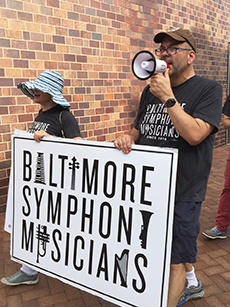
In its more-than-100-year history, the BSO has experienced five prior work stoppages: strikes in 1937, 1968, 1971, and 1988, and a lockout in 1981. The longest work stoppage was a 22-week strike from September 1988 to February 1989.
Musicians call the lockout a management scare tactic and dispute the severity of the financial crisis. They say that the BSO could pay them for the summer by drawing additional funds from the $72.6 million BSO endowment trust, on top of the $3.838 million annual draw that is part of the operating budget. Brian Prechtl, co-chair of the Players’ Committee, observes that if the lockout continues until September, the orchestra will save $2.5 million on musicians’ wages and health care—which is coming directly out of musicians’ pockets. “Our line of the budget has remained flat for at least 10 years.” Musicians have made several concessions over a decade of negotiations. Their contracts have only recently returned to 2008 compensation levels.
According to longtime BSO subscriber and donor John Warshawsky, who heads the advocacy group Save Our BSO, the lockout emphasizes the importance of growing the endowment to achieve long-term stability. At the same time, it fails to highlight the hardship and unexpected loss of paycheck for the 75 orchestra members.
BSO management and board have failed to maximize donations and income, including a year in which the orchestra operated without a director of development. In addition to the Meyerhoff Symphony Hall in the Mount Vernon neighborhood of Baltimore, the orchestra performs at a second venue at Strathmore, in Montgomery County, one of the wealthiest parts of the state. Many argue this exclusive area has never been fully tapped for its potential.
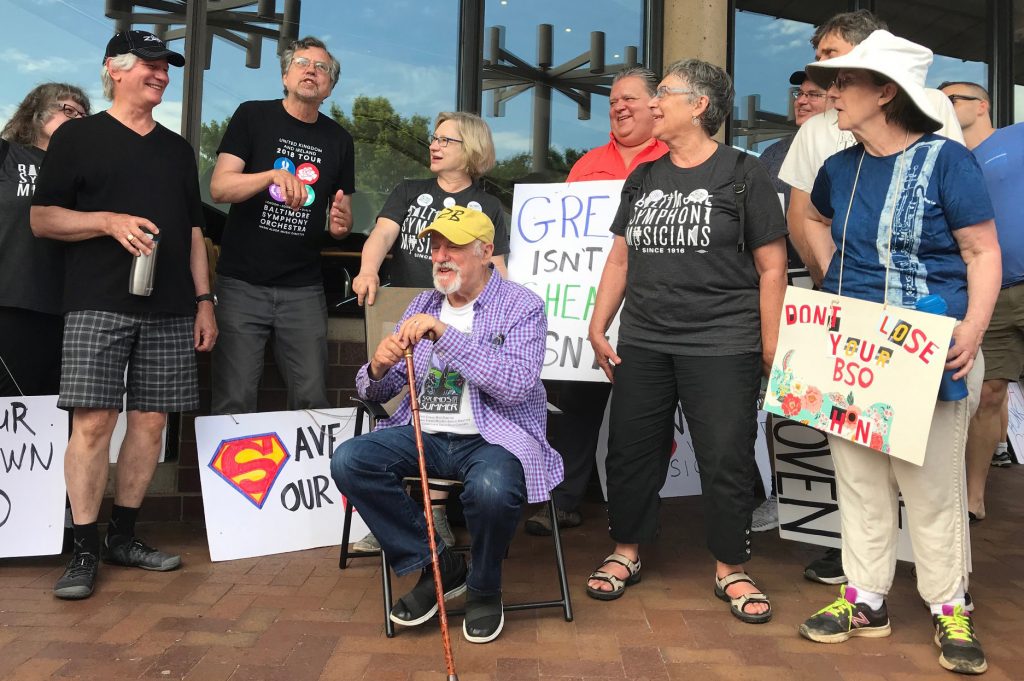
As of this writing, Baltimore Symphony Musicians are picketing at the Meyerhoff Symphony Hall. More negotiations between musicians and management will be scheduled.
The musicians have received strong support from many quarters. Delegates to the 101st AFM Convention, held June 17-20 in Las Vegas, pledged nearly $100,000 in support for the locked-out musicians. The delegates also unanimously adopted an Emergency Resolution condemning the actions of BSO management and calling for an end to the lockout.
How to donate to the Baltimore Symphony Orchestra musicians
To send online contributions to the Baltimore Symphony Musicians, visit www.bsomusicians.org/public_html/donate/
To send contributions to the Baltimore Symphony Musicians by check:
Send check to:
Greg Mulligan
Co-Chair, Baltimore Symphony Players Committee
11955 Long Lake Drive
Reisterstown, MD 21136
Make check payable to: Baltimore Symphony Musicians, Inc.
To send contributions to The Musicians’ Association of Metropolitan Baltimore to help offset the loss of work dues:
Send check to:
The Musicians’ Association of Metropolitan Baltimore
1055 Taylor Avenue, Suite 218
Baltimore, MD 21286
Make check payable to “Local 40-543, AFM”
The most recent updates about the Baltimore Symphony Musicians can be found on their Facebook page: www.facebook.com/BaltimoreSymphonyMusicians.
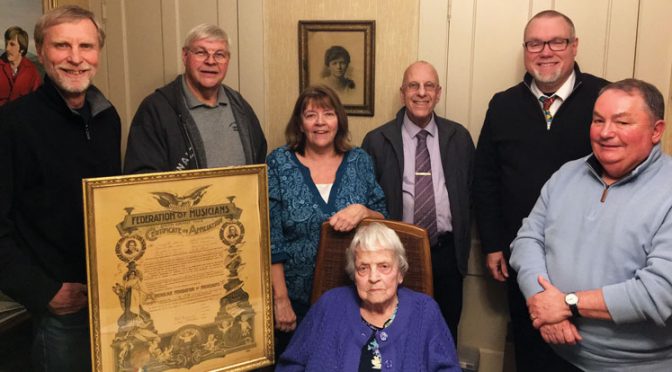
Local 374 – Still Serving After 115 Years
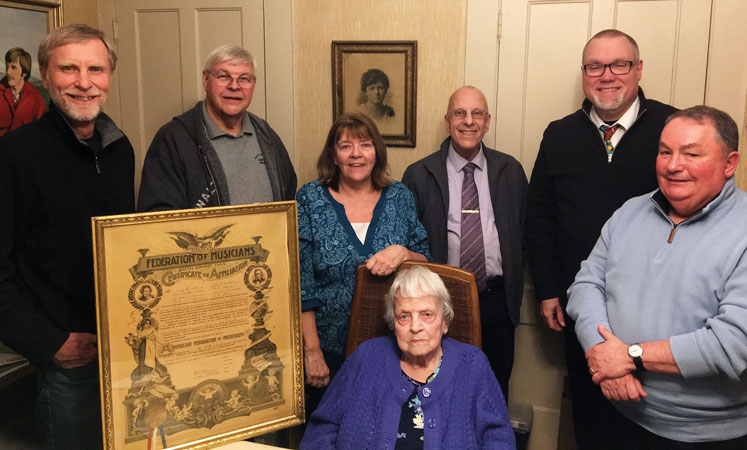
Local 374 (Concord, NH) celebrated its 115th year of service at its monthly meeting on May 2, during which the executive board also showcased the original “Certificate of Affiliation” that was drawn up on April 22, 1904.
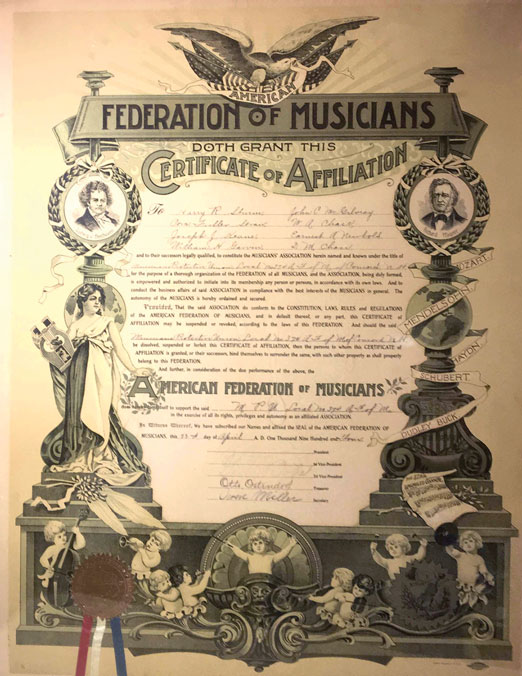
The certificate states in part, “The American Federation of Musicians doth grant this Certificate of Affiliation to (its members and officers) and to their successors legally qualified to constitute the Musicians Association herein named and known under the title of, Musicians Protective Union Local 374 AF of M of Concord, NH.”
“It is amazing to think that after 115 years we, the ‘successors legally qualified’ are still performing the duties of the union, in the spirit of our predecessors and serving the present-day members!” says Local 374 President George West.
Local 374 unofficial historian Deb Lincoln researched the names of the eight men who appear on the Certificate of Affiliation and found two of the signers pictured in a photograph of the Third Regiment New Hampshire National Guard Band at their June Encampment in 1890. Those same two signers, as well as three others, are pictured in a photograph of the Second Regiment New Hampshire National Guard Band at Hampton Beach in 1901.
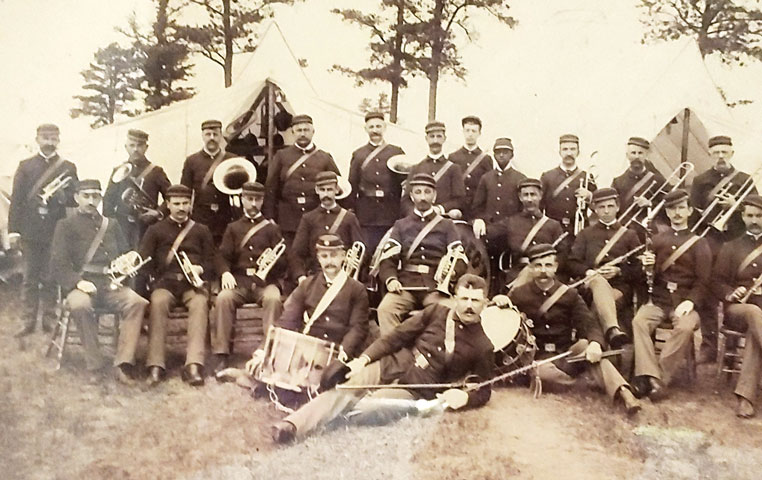
The Third Regiment Band was reorganized on January 23, 1900 to conform with the Infantry Regiments of the US Army and the US drill regulations, and thus became the Second Regiment New Hampshire National Guard Band. Arthur Nevers, famed New Hampshire cornetist, is also seen in both of those photos as the director of both bands. The current day Nevers’ Second Regiment Band of Concord, New Hampshire, derives its compound name from both the Second Regiment New Hampshire National Guard Band and Arthur Nevers, who directed the band from 1884 to 1940.
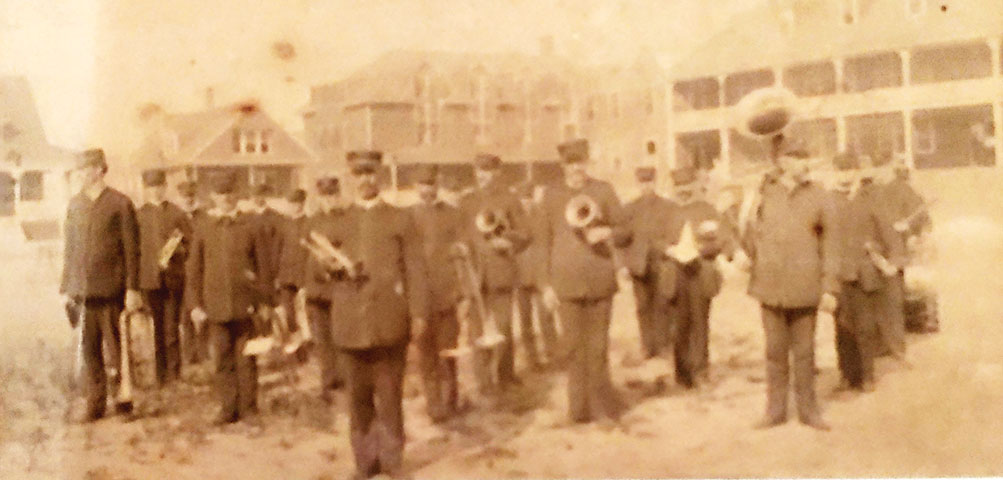
It is also worth noting that in 1905 the Second Regiment New Hampshire National Guard Band performed in Portsmouth, New Hampshire, at the signing of the Russo-Japanese Peace Treaty.
“We wonder if the signers of the AFM Certificate of Affiliation were still members of the Second Regiment Band and played for the Peace Treaty?” Lincoln says. “We think they’d be pleased that we have learned of their musical contributions and how they safeguarded area musicians by initiating Local 374.”
Uber and Lyft Drivers Protest Ahead of IPO
Uber and Lyft drivers in more than a dozen cities around the world are participating in an international day of protest, calling for better wages and working conditions days ahead of Uber’s estimated $91 billion IPO. Spearheaded by Rideshare Drivers United, a Los Angeles-based association of drivers, many are calling on passengers to temporarily boycott the ride services by turning off the apps.
Cofounder and former CEO Travis Kalanick’s stake may be worth as much as $5.9 billion. But the IPO will not be life-changing for most drivers, who Uber insists are independent contractors, not employees.
From Melbourne, Australia, to New York City, drivers and supporters rallied to protest the business model that many say exploits workers. The fact that drivers in different cities were able to gather and protest on the same day, creating headlines around the world, appeared to be major feat of the organizing capacity of drivers. It’s one of the largest coordinated protests by gig economy workers in recent history.
According to Chicago driver Lenny Sanch, who helped organize a rally outside City Hall, “The day of action was already a success prior to it starting. We caused an organic rising in a short amount of time.”
Candidates Seeking Election for AFM Office
An important part of each AFM Convention is the nomination and election of international officers who will lead the organization during the next three years. Also elected are delegates to the AFL-CIO Convention. Article 19, Section 2 of the AFM Bylaws provides for the publication of campaign statements by those candidates who have declared their intent to run for office. No candidate is required to publish a statement and all candidates may at any time prior to nominations pursue an office other than the one identified below.
INTERNATIONAL PRESIDENT
Raymond M. Hair, Jr., Local 72-147 (Dallas-Ft. Worth, TX)
Thank you for the privilege of serving as your president with this marvelous Unity Team. We’ve restored and maintained fiscal responsibility. We’re negotiating and enforcing smart, progressive agreements with openness, activism, and real unionism. Through governmental advocacy, we’ve protected musicians’ interests and improved their lives. We’ve opened doors and found new rights money for AFM members, who make the music the world wants to hear. Difficult problems resolve with teamwork and unity. We’ll preserve and protect our union and together we will keep it strong, because together, we can. We ask for your vote. We are a winning team.
INTERNATIONAL VICE PRESIDENT
Bruce Fife, Local 99 (Portland, OR) President
As your international vice president and member of the Unity Team, thank you for your trust, support, and confidence as we continue to embrace our many challenges, creating pathways for success. As a team, we face our challenges together, but each individual is also tasked with specific assignments. My critical charge had me crisscrossing our two countries, delivering a much-needed officer education program to local leaders. These trainings provide the foundation for rebuilding our membership and power of our great union, especially when combined with the accomplishments and ongoing commitments of the Unity Team. We ask for your vote.
VICE PRESIDENT FROM CANADA
Alan Willaert, Local 149 (Toronto, ON)
It has been an honour to serve as the AFM Vice President from Canada, and as a member of Team Unity. Canadian members and locals have many accomplishments to be proud of in terms of lobbying government for positive change and seeking out new employers to establish agreements with fair wages and benefits. The experience I have gained will be advantageous for the future. More determined than ever to finish the remaining challenges, I ask for your support, your confidence, and your vote at the 101st AFM Convention.
INTERNATIONAL SECRETARY-TREASURER
Jay Blumenthal, Local 802 (New York City)
It has been a great privilege serving as your international secretary-treasurer for the past three years. The Unity Team goals of improving the financial stability of the AFM and moving the AFM NY office to a beautiful new office space were both accomplished. The AFM General Fund net assets have increased by nearly $5 million during the past three years. But many important challenges remain such as organizing to bring the protections of a union contract to more and more musicians. We hope to continue our work to serve you and the entire AFM membership over the next three years.
INTERNATIONAL EXECUTIVE BOARD
John Acosta, Local 47 (Los Angeles, CA) President
It has been a great privilege to represent the members of the American Federation of Musicians on the International Executive Board. Working with you, the greatest musicians in the world, AFM President Hair, my fellow board members, and local officers across the US and Canada, we have tackled many difficult issues together. However, our work is far from done. United, we can ensure that musicians earn a fair wage, receive respect on the job, and are able to retire with dignity. There are no doubt great challenges ahead, but when we stand united we will always be stronger together!
Mike Allen, Local 20-623 (Denver, CO) President
2020 will mark my 40th anniversary of membership in the AFM and Local 20-623. In 2015, it was my honor to assume the leadership of our local after accumulating many years of rank-and-file bargaining experience, as well as working with colleagues to create new bargaining units. Recently, the DMA has grappled with unique and thorny issues that have provided a rich learning environment in which to better understand the inner workings of our union and labor law. I would be honored by the opportunity to put those experiences to work in representing mid-size locals on the IEB.
Luc Fortin, Local 406 (Montreal, PQ) President
Dear brothers and sisters, it is with enthusiasm that I submit my candidacy for the office of the International Executive Board. Union values have always guided me and prevailed in all the decisions I had to make. I started my union career almost 15 years ago, first as director and, since 2006, as president of Local 406 (Montreal, Canada), the third largest local of the Federation with 3,200 members. During my tenure as president I restructured our finances and governance with great success. I sincerely believe that my long experience will be very useful to our union.
Tino Gagliardi, Local 802 (New York City)
The record of the Unity Team represents the experience and hard work needed to protect and better the livelihoods of musicians. We have bargained dozens of progressive agreements in the United States and Canada with our industry’s largest employers giving voice to the world-class musicians we represent. Bargaining hard for real gains is the hallmark of the Unity Team. Through advocacy, we continue to advance IP rights for musicians and bargain new revenue streams and fair compensation for our recordings. Our foundation is strong; together, we will continue to build a strong future for all musicians of the AFM.
Ed Malaga, Local 161-710 (Washington, DC) President
As a candidate for the IEB, it is an honor to be included on President Hair’s Team Unity. During my nine years as president of Washington, DC, Local 161-710, I’ve had the privilege of working with this administration at the bargaining table, on organizing campaigns, and in legislative efforts. The commitment and dedication to improving the lives of our AFM membership has always been paramount. As a local officer and working musician, these are values which have informed my own record of service, and which I will bring towards the promotion of a strong, progressive, and inclusive AFM.
Tina Morrison, Local 105 (Spokane, WA) President
My name is Tina Morrison and I ask for your vote as part of the Unity Team to continue serving on the International Executive Board. I’m in a unique position as president of AFM Local 105 and secretary treasurer of the Spokane Regional Labor Council to examine other unions, gain new perspectives, and identify opportunities to help us build solidarity and leverage for musicians. I’m involved with AFM Education and Diversity committees, working to build programs to inform and strengthen our union. AFM Bylaws, Article 2, Mission Statement is our guide for a strong union that works for all musicians.
Dave Pomeroy, Local 257 (Nashville, TN) President
Since 2010, I have been honored to serve all AFM musicians as an IEB member. We have worked hard to rebuild the AFM’s finances and resolve internal conflicts. Drawing on my experiences as a working musician, I have brought new concepts to the AFM, including affordable scales for home recording, and payment for the use of studio tracks in live performance. The IEB shares a common goal of raising the bar for all our members. We have made significant progress, but we can do more with your help. I respectfully ask for your vote as part of this unified team.
Beth Zare, Local 6 (San Francisco, CA) Secretary-Treasurer
My experience as current secretary-treasurer of a large local (San Francisco), former president of a smaller local (San Jose), and previous ROPA representative has specially prepared me for serving you on the IEB. Additionally, as a member of the AFM Diversity Committee, I created content for the Women’s Caucus at the previous two conventions. I’ve dedicated my life and career to the underserved, giving voice to those who have none. As your elected IEB representative, I will address your concerns and use my strengths to promote change. We need to become relevant for our survival. Together, we can do this.
Recommendations and Resolutions of the IEB for the 101st Convention
In conformity with Article 18, Section 5, and Article 18, Section 4 (d), of the AFM Bylaws, the following are the Recommendations and Resolutions to be presented by the International Executive Board (IEB) to the 101st Convention of the American Federation of Musicians for consideration by the elected delegates. For more information about the AFM Convention, visit www.afm.org/convention.
RECOMMENDATION No. 1
RESOLVED, That no changes be made to the rates of Federation Work Dues, Federation Initiation Fees or Federation Per Capita.
Submitted by the International Executive Board
_____________________________________
RECOMMENDATION No. 2
RESOLVED, To amend Article 5, Section 47(a), as follows:
SECTION 47(a). Each Local shall pay to the AFM Per Capita Dues at the rate of $66 per annum for each Regular, Student and Youth member and $50 per annum for each Life member in good standing with the Local. Federation Per Capita Dues shall include the subscription fee of $2 for the Official Journal, [and ]a contribution of 10 cents to the Lester Petrillo Memorial Fund as required to maintain the Fund at a balance of no less than $500,000, and a contribution of 10 cents to the AFM Emergency Relief Fund as required to maintain the Fund at a balance of $100,000.
Submitted by the International Executive Board
_____________________________________
RECOMMENDATION No. 3
RESOLVED, To amend Article, 19, Section 8(a), as follows:
SECTION 8(a). The number of candidates to be elected as AFL-CIO Convention Delegates receiving the highest number of votes shall be declared elected. If an elected AFL-CIO Convention Delegate is unable to attend the AFL-CIO Convention, the candidate receiving the next highest number of votes who is able to attend shall be the alternate, provided that if there are no remaining candidates able to attend, the International President shall have the authority to appoint an alternate. If the elected AFM Delegates to the AFL-CIO Convention do not meet the AFL-CIO diversity standards, the President has the authority to appoint an additional Delegate who complies with these standards. AFM Delegates to the AFL-CIO Convention shall be allowed to their hotel and traveling expenses for attending the AFL-CIO Convention.
Submitted by the International Executive Board
____________________________________
RECOMMENDATION No. 4
RESOLVED, To amend Article 6, Section 5(c), as follows:
SECTION 5(c). Emergency relief loans of up to 20% of the funds available as of April 1 of the current year shall be available to members of participating orchestras that are current in their payments to the Fund. Loans shall be payable from the Fund only after a strike has been ordered or approved by: (1) the players of a participating orchestra acting by at least a majority vote or in accordance with some other established written policy requiring more than a majority vote, (2) the Local Executive Board, and (3) the International President’s Office. Emergency relief loans shall be payable from the Fund in the event of a lockout or other serious confrontation with management that, in the Trustees’ opinion, should be considered for emergency relief.
BE IT FURTHER RESOLVED, To amend Article 6, Section 5(e), as follows:
SECTION 5(e). Loans shall be repaid without interest in 12 equal monthly installments commencing on the first day of the month following resolution of the confrontation. At the end of the 12-month period, any outstanding unpaid balance will be charged interest calculated at the Wall Street Journal (WSJ) prime rate in effect on the first day following the 12-months period until said balance is paid in full. In the event of hardship, a feasible payment schedule shall be determined by the Trustees. A member failing to make repayment after due notice from the International Secretary-Treasurer will be subject to disciplinary charges in accordance with Article 11, Section 2(a)ii of these Bylaws. A member found guilty of failing to make repayment will be subject to a fine, suspension and/or expulsion in addition to a judgment in the amount of the unpaid balance, accrued interest, legal fees and collection costs.
BE IT FURTHER RESOLVED, To amend Article 11, Section 2(a)ii, as follows:
SECTION 2(a)
ii. If a Local or an AFM Bylaw is allegedly violated by a member of the Local having jurisdiction where the alleged violation occurred, the Local where the alleged violation occurred shall try the charges against the member. However, any alleged violations of Article 6, Section 5; Article 15 (Recordings), Sections 1, 2, 3, 4, 5, 6(b); or to Article 5, Section 41; shall be tried by the IEB or an IEB subcommittee or a referee appointed by the International President.
Submitted by the International Executive Board
____________________________________
RECOMMENDATION No. 5
RESOLVED, To amend Article 18, Section 16(b) as follows:
SECTION 16(b). Printed copies of the Annual Report booklet shall be printed and mailed by request to any Local or accredited Delegate to the AFM Convention, if possible, on or before May 1 of the Convention year. [Printed copies of the Annual Report booklet shall be submitted by request to any AFM Local no later than June 30 of those years during which no Convention is held.] Requests for printed copies are to be made in writing to the International Secretary-Treasurer, postmarked or electronically transmitted not later than March 30 of the Convention year.
Submitted by the International Executive Board
____________________________________
RECOMMENDATION No. 6
RESOLVED, To amend Article 11, Section 2(b), as follows:
SECTION 2(b). Any alleged violation of Article 8 (Unfair List), or of Article 10 (Rights and Duties of Members) with regard to an engagement on which any musician performed who is not a member of the Local in which the alleged violation occurred, shall be tried by the IEB, an IEB subcommittee, or a referee appointed by the International President.
Submitted by the International Executive Board
____________________________________
RECOMMENDATION No. 7
RESOLVED, To amend Article 5, Section 6, as follows:
SECTION 6. The Local Secretary shall provide monthly to the International Secretary-Treasurer, in a manner and form approved by the IEB, an update of the Local’s membership roster, which shall include: the name and a/k/a address, Local affiliation, social security/social insurance number, e-mail address(s), date of birth, date of admission to the Local and the home, business and cell phone numbers of each of the Local’s members and nonmember fee payers (i.e., nonmembers who, by law or agreement, pay fees in lieu of membership dues), as such information may exist.
Submitted by the International Executive Board
____________________________________
RECOMMENDATION No. 8
RESOLVED, To amend Article 5, Section 55(d)i., as follows:
SECTION 55(d). The maximum amount of Work Dues payable by any Local members for performing services within the jurisdiction of a Local of which they are members shall not be more than the following:
i. 4% of the scale wages earned for employment under AFM-negotiated Agreements covering services rendered for electronic media (recordings, broadcasts, films, video, etc.) plus the minimum Federation Work Dues percentage amounts set forth in the chart in Article 9, Section 32(b);
Submitted by the International Executive Board
____________________________________
RECOMMENDATION No. 9
RESOLVED, To delete Article 3, Section 8(b) in its entirety.
Submitted by the International Executive Board
____________________________________
RECOMMENDATION No. 10
RESOLVED, To amend Article 18, Section 4(a), as follows:
SECTION 4(a). Delegates, Locals, or Conferences desiring to introduce a Resolution for consideration by the Convention must forward it in writing to the International Secretary-Treasurer, postmarked or electronically transmitted not later than March 1 of the Convention year. All electronically transmitted Resolutions must also be submitted by mail, postmarked no later than the next business day after March 1. Resolutions must bear the signatures of all sponsoring Delegates, or the signatures of authorized officers of sponsoring Locals or Conferences.
BE IT FURTHER RESOLVED, To amend Article 19, Section 2, as follows:
SECTION 2. Candidates seeking election to any International Office may forward to the International Secretary-Treasurer, postmarked or electronically transmitted not later than April 1 of the Convention year, a statement certifying their intention of seeking election for the particular Office and a campaign statement that shall not exceed 100 words. All electronically transmitted statements must also be submitted by mail, postmarked no later than the next business day after April 1. The International Secretary-Treasurer shall publish the names and campaign statements received from candidates in the International Musician prior to the Convention.
____________________________________
RECOMMENDATION No. 11
RESOLVED, To amend Article 8, Section 3, as follows:
SECTION 3. Members shall not render musical services for organizations, establishments, or people (or their principals) who are listed on the International Unfair List. [Further, Members shall not render musical services with or for people who are listed on the International Unfair List nor with or for people who have been employed by, are principals of, or are otherwise associated with organizations or establishments that are listed on the International Unfair List.] Any member who violates this Section shall be subject to penalties in accordance with Article 11, Section 13 [See Article 13, Section 4].
Submitted by the International Executive Board
____________________________________
RECOMMENDATION No. 12
RESOLVED, To add a new subsection to Article 5, Section 29, as follows:
NEW SECTION. SECTION 29(c). The IEB shall have the authority to negotiate agreements or promulgate scales and conditions for the benefit of local and traveling members engaged by an employer for a series of related or substantially similar live productions presented in more than one Local jurisdiction whenever the IEB determines that the establishment of national or international employment standards for such series is necessary to secure the employment of Local members or prevent the erosion of Local standards. Such agreements or scales shall provide that they are not applicable to employment in locations in which employment is subject to a Local CBA that provides for higher wages and conditions. Federation work dues on such employment shall be 3.25% as provided elsewhere in these Bylaws, allocated 2% to the Local(s) in which the work is performed and 1.25% to the Federation.
Submitted by the International Executive Board
____________________________________
RESOLUTION No. 1
WHEREAS, There exists an overwhelming and unfair imbalance between work opportunities for AFM travelers and AFM local musicians; and
WHEREAS, The imbalance is caused by the terms of the AFM Pamphlet B, Rule 24, the terms of the Short Engagement Tour Agreement and the willingness on the part of the AFM to designate touring shows as “self-contained,” contrary to the historical meaning of that term; and
WHEREAS, The terms of Rule 24 are an anachronism that should have been modified years ago in that, for example, Rule 24, by its express terms, only applies to venues that had local minimums in place in collective bargaining agreements that were in effect “on January 29, 1992,” and
WHEREAS, As such Rule 24, by its express terms, does not apply to any venues that were opened and/or first organized over the last 25 years; and
WHEREAS, Further, Rule 24, by its express terms, will not apply to any venues organized by an AFM union local in the future; and
WHEREAS, While some producers will honor local minimums at venues where minimums were not in place as of January 29, 1992, some producers now are only agreeing to layoff based on the actual terms of Rule 24; and
WHEREAS, Short Engagement Tour Agreements are being negotiated by the AFM based on the principle that all work will be performed by touring musicians with certain exceptions that are not applicable to many organized venues; and
WHEREAS, AFM union locals that have theater musicians members have a fiduciary responsibility to those members to act on their behalf in relation to work opportunities; and
WHEREAS, The current Pamphlet B will expire on March 15, 2020 be it
RESOLVED, That
the AFM and any affiliate participating in the negotiation of Pamphlet B and/or any Short Engagement Tour Agreement will propose and remain committed to the principle that any agreement must include a requirement that Local Musicians will be used exclusively in any city where there exists sufficient Local Musicians; and
the AFM is prohibited from submitting for ratification any agreement that does not include a requirement that Local Musicians will be used exclusively in any city where there exists sufficient local musicians; and
commencing immediately and continuing forward, the AFM shall only designate a touring show as “self-contained” in accordance with the language and original intent of Rule 24E.
Submitted by George Troia, Local 5
Pat Hollenbeck, Local
9-535
Mark Pinto, Local 9-535
John Van Voris, Local 14
Anthony Scally, Local
16-248
Michael Allen, Local
20-623
Lovie Smith-Wright, Local
65-699
Sharon Montgomery, Local
65-699
David Angus, Local 66
Daniel Cerveny, Local
70-558
Catherine Sheridan, Local
85-133
Wendy Pace, Local 92
Candace Lammers, Local
400
Local 506
____________________________________
RESOLUTION No. 2
WHEREAS, There is a developing trend of self-contained musical theater touring productions; and
WHEREAS, There is also a trend of reduced orchestrations for musical theater orchestras; and
WHEREAS, The trend of reduced orchestrations, and in particular reduced orchestrations for musical theater tours, is a major contributing factor to self-contained musical theater touring productions; and
WHEREAS, These trends have led to a decline in the employment of local musicians and traveling musicians for tours covered by the AFM Pamphlet B Agreement and other AFM touring agreements; and
WHEREAS, The use of reduced orchestrations for musical theater tours has had a cascading effect on strictly local theater productions and even on the availability of full orchestrations from the publishing houses—casting a chill throughout the theater musician community; and
WHEREAS, Musical theater tours that are covered under AFM Agreements are negotiated and finalized between the Federation and the Producers; and
WHEREAS, Not all AFM musical theater tours have utilized an orchestra with fewer musicians than the orchestra used for the Broadway or London productions; and
WHEREAS, Leverage is a fundamental component of influence in any negotiations; and
WHEREAS, Organizing gives a voice to those who have no voice and empowers those who have no power, thereby increasing leverage for bargaining; now, therefore, be it
RESOLVED, That the Federation shall take all actions necessary and appropriate to influence producers of touring musical theater productions to use fuller orchestras and employ more musicians, both local and traveling, including but not limited to initiating and promulgating organizing projects at all levels of the AFM that concern employment for musical theater musicians.
Submitted by TMA
Gary Lasley, Local 47
Local 198-457
Craig Gibson, Local 353
____________________________________
RESOLUTION No. 3
WHEREAS, There is a recent proliferation of shows, events, and other attractions (hereto “Engagements”) touring throughout the United States and Canada that employ musicians who are not covered by any type of employment agreement; and
WHEREAS, Such Engagements create a work environment that leaves musicians vulnerable to exploitation by producers, employers, and employer-agents; including but not limited to standard wages and no benefits, and
WHEREAS, Such Engagements negatively affect employment standards of AFM Local jurisdictions; and
WHEREAS, There are AFM Locals that have written agreements that do not negatively affect other AFM Locals and may effectively raise employment standards for musicians; and
WHEREAS, Such agreements should remain in full force and effect for the work that they cover; now therefore, be it
RESOLVED, That Article 5, Section 29 of the Federation Bylaws be amended as follows:
NEW SECTION. 29(c) Except in cases where a Local has a collective bargaining agreement or other written agreement in full force and effect covering the affected employment, the IEB shall have the authority to negotiate agreements or promulgate scales and conditions for the benefit of local and traveling members that would perform such engagements whenever the IEB determines that local musical engagements offered or presented in more than one Local jurisdiction by a person, firm, or corporation for substantially the same production (i) is affecting or may affect musician employment standards negatively in multiple Local jurisdictions, or (ii) raises other concerns or issues of national or international nature that transcend the geographic boundaries of the Locals.
Submitted by TMA
____________________________________
RESOLUTION No. 4
WHEREAS, There exists an overwhelming and unfair imbalance between the cost, rules, and delays facing Canadian musicians travelling to the United States of America for musical engagements versus the same favourable set of rules facing American musicians travelling to Canada for musical engagements; and
WHEREAS, the Federation is in a unique position to advocate on behalf of Canadian musicians to alleviate these challenges as an international union with jurisdiction in both the United States and Canada. Now therefore, be it
RESOLVED, 1. That the IEB set aside an amount of financial and staff resources to advocate for better conditions for Canadian musicians travelling for work to the United States, and, and 2. that the AFM explore with the Federal governments of both the United States and Canada measures towards these same goals.
Submitted by Local 149
____________________________________
RESOLUTION No. 5
RESOLVED, That Article 3, Section 2, of the AFM Bylaws be amended as follows:
SECTION 2. Any AFM member who has been in good standing for at least two continuous years immediately preceding the date of his/her nomination for election to an AFM office shall be eligible to be an AFM Officer, except that in the case of the Vice-President from Canada, he/she must, in addition to the foregoing, be a citizen or [landed immigrant] permanent resident of Canada. No member may hold more than one Office.
And be it further
RESOLVED, That Article 19, Section 3, be amended as follows:
SECTION 3. Candidates seeking election to any Federation Office may only be nominated by a Convention delegate at the Convention. Only members who have been in good standing for at least two continuous years immediately preceding the date of his/her nomination may be nominated except that in the case of the Vice-President from Canada, he/she must, in addition to the foregoing, be a citizen or permanent resident of Canada. No member may be nominated for more than one Office. The time of nominations and election of Officers shall be designated by the Convention not later than the first day it is in session. A correct copy of the names of all nominees shall be furnished to each Delegate and the election shall be conducted in accordance with the Australian ballot system. Nominating speeches by Delegates shall be limited to two minutes each.
Submitted by Canadian Conference
OCSM
RESOLUTION No. 6
WHEREAS, Article 9, Section 36 (a) of the AFM Bylaws describes a complicated procedure to collect traveling members’ work dues that has become inefficient and outdated; and
WHEREAS, Very few AFM Locals still attempt to collect these dues, and a considerable amount of money has been, and still is, being left on the table; and
WHEREAS, This process would be much more efficient if the AFM Live and Touring Department were to create one agreement for an artist’s entire tour, rather than having many Locals individually chasing bandleaders and musicians from other Locals for small amounts of money; and
WHEREAS, The Federation Agreement with AFM signatory booking agents contains no references to the collection of Traveling Work Dues; therefore, be it
RESOLVED, That the International Secretary-Treasurer create a new process to 1) reach out to major touring artists and their booking agents, managers, music directors, and/or bandleaders, 2) identify the performing musicians on a given tour and determine who is the responsible party for collection and submission of Traveling Work Dues payments to the AFM, 3) create a single tour agreement, either in advance, during, or upon the conclusion of an entire tour for the purposes of collection of Traveling Work Dues, and 4) devise a formula to divide the money received equitably between the Federation and applicable Locals.
Submitted by Local 257
____________________________________
RESOLUTION No. 7
RESOLVED, That Article 6, Section 5 (a), of the AFM Bylaws be amended as follows:
SECTION 5(a). Participation in the Fund shall be in accordance with ROPA Bylaws by ROPA Full Member [o]Orchestras [operating under a CBA with budgets of $800,000 or more]. Associate Member Orchestras [not meeting the budgetary requirement cited above] may not participate in the Fund [upon the Trustees’ approval] unless otherwise determined by the Trustees of the Fund.
And be it further
RESOLVED, To modify the Glossary of Terms and Acronyms as follows:
ROPA—Regional Orchestra Players’ Association, a player conference of symphonic musicians employed by [US] regional orchestras [with lower operating budgets] in the United States.
Submitted by ROPA
____________________________________
RESOLUTION No. 8
RESOLVED, That Article 22, Section 7 (a), be amended to provide as follows:
SECTION 7(a) As a matter of policy, at least three rank-and-file musicians, selected in consultation with the Player Conferences Council and the Freelance Musicians representative(s), shall be included among the Trustees appointed by the President to the Board of the American Federation of Musicians and Employers’ Pension Fund (U.S.). In addition, no later than September 30, 2019, and at all times thereafter, there shall be included among the Trustees appointed by the President to the Board of the American Federation of Musicians and Employers’ Pension Fund US the following experts: one person who has demonstrable expertise in the area of investments; and one person who has demonstrable actuarial expertise in the pension field.
Submitted by Adam Krauthamer, Local 802
Peter Donovan, Local 802
William Hayes, Local 802
Caryl Paisner, Local 802
Javier Gandara, Local 802
Dean LeBlanc, Local 802
____________________________________
RESOLUTION No. 9
RESOLVED, That the following new section be added after Article 5, Section 50:
NEW SECTION. Each Local shall receive as a credit, and be entitled to an offset, against any dues, fees, assessments, and fines owed under these Bylaws all costs, salaries, benefits, rents, and charges of any kind incurred by such Local in collecting, administering, processing, and remitting, any payments owed to the AFM (including but not limited to royalties and fees) under any AFM contract.
Submitted by Adam Krauthamer, Local 802
Peter Donovan, Local 802
William Hayes, Local 802
Caryl Paisner, Local 802
Javier Gandara, Local 802
Dean LeBlanc, Local 802
____________________________________
RESOLUTION No. 10
RESOLVED, That Article 5 of the AFM Bylaws be amended as follows:
NEW SECTION. No officer of the AFM or any of its Locals shall have the authority to alter, or agree with an employer to alter, any CBA of the AFM or any of its locals, except through the course of collective bargaining permitted by these bylaws.
Submitted by John O’Connor, Local 1000
____________________________________
RESOLUTION No. 11
RESOLVED, That Article 9 of the AFM Bylaws be amended as follows:
NEW SECTION. Other than membership dues, work dues, and fees required or permitted by the AFM or its Locals under these Bylaws, no other dues shall be required of members of the AFM.
Submitted by John O’Connor, Local 1000
____________________________________
RESOLUTION No. 12
RESOLVED, That Article 9 of the AFM bylaws be amended as follows:
NEW SECTION. Voluntary dues or contributions from members of the AFM Locals or its bargaining unit committees or projects must be authorized by the Local acting as the bargaining agent for said bargaining unit. Any funds collected shall be the property of the Local and reported as such on any necessary or required reports. (For example, financial reports and LM reports).
Submitted by John O’Connor, Local 1000
____________________________________
RESOLUTION No. 13
RESOLVED, That Article 9, Section 32 (c), of the AFM Bylaws be amended as follows:
Section 32 (c).
i. For employment under Pamphlet B—Touring Theatrical Musicals, or for employment under any other AFM-negotiated agreement(s) or “Pamphlets” covering touring employment in which the members have voted to participate in the Theater Defense Fund in accordance with Article 6, Section 6(b)(ii), Work Dues shall be 3 ¾% of scale wages and shall be payable to the AFM.
ii. For any other employment under AFM-negotiated Agreements and “Pamphlets” covering touring employment, Work Dues shall be 3 ¼% of scale wages and shall be payable to the AFM.
iii. Half of any Work Dues collected pursuant to this subsection shall be distributed by the AFM to any Local the geographic territory of which includes the place where the wages have been earned.
Submitted by Jack Gaughan, Local 369
Keith Nelson, Local 369
Alan Cates, Local 369
____________________________________
RESOLUTION No. 14
RESOLVED, That Article 9, Section 16, of the AFM bylaws be amended as follows:
SECTION 16. [A member may petition the] The Secretary-Treasurer shall issue [for] a rebate equal to the Per Capita dues received by the AFM by virtue of that member’s membership throughout the entire prior year in each AFM Local in excess of two. [After the International Secretary Treasurer has confirmed that the member had been a member of more than two locals throughout the year, the AFM shall pay a rebate to a member.]
Submitted by TMA

Grover Pro Percussion Named Manufacturer of the Year

The Small Business Administration (SBA) has named Grover Pro Percussion Inc. the 2019 Small Business Manufacturer of the Year for Massachusetts. Grover Pro Percussion earned the recognition for supplying the global music industry with locally manufactured percussion instruments for 40 years.
Based in Woburn, MA, Grover Pro employs a team of percussion specialists and production experts that has established the company as a market leader in the design, manufacturing, and exporting of percussion instruments across the globe.
“We’re honored to recognize Neil Grover, a world-class musician and world-class small business owner,” said SBA Massachusetts District Director Robert Nelson. “Thriving as a local manufacturer for 40 years is a significant achievement in itself, but Grover Pro’s export business has been a very important aspect of their success that has kept the company sustainable through the years.”
Exporting makes up a significant percentage of total sales for the company—currently shipping to countries including Japan, Australia, Korea, China, Taiwan, United Kingdom, Spain, France, and Germany. In addition to supplying the world’s most prestigious concert halls and orchestras around the world, Grover has made several contributions to the music industry through business ownership, through several inventions and product innovations.
“I am honored to receive this prestigious award” said Founder Neil Grover, a member of AFM Local 9-535 (Boston, MA). “Our products, which are heard on virtually every major motion picture score, Broadway show, and in concert halls around the globe, resonate with the superlative sonority of American made quality.”
Grover is a renowned percussionist, music educator, innovator, and entrepreneur with distinct credentials in the entertainment industry. Grover’s career highlights ranges from performances with the Boston Symphony & Boston Pops, on iconic soundtracks such as Indiana Jones and the Temple of Doom, and with rock band Aerosmith. In 2006, the Discovery Channel’s “How It’s Made” highlighted Grover Pro Percussion and introduced their products to millions of viewers around the globe.
Grover will be honored at the annual SCORE Boston / SBA awards luncheon along with other 2019 Massachusetts Small Business Week winners at Assumption College on Wednesday, May 8, 2019.
Notre Dame Organ Spared

The devastating April 15 fire at Notre Dame Cathedral in Paris shocked the world; but musicians, especially, have been anxious to learn the fate of the cathedral’s historic Great Organ, considered one of the most prestigious musical instruments in the world. The famous Cavaillé-Coll organ, built in 1868, has five keyboards, 115 stops, and nearly 8,000 pipes, some of which date back centuries.
One day after the fire, Notre Dame organist Olivier Latry announced on Facebook that the organ miraculously escaped the flames and the water used to extinguish them, but will still need some restoration work. Though the organ is very dusty, we will be able to enjoy it again once the building is restored. “When? No one knows yet,” he wrote.
Vincent Dubois, another of the three main organists at Notre Dame, also released a statement on Facebook stating, “Contrary to rumors that have circulated, the great organ is, a priori, saved. There are a few puddles on the left and right, but nothing dramatic. The case and pipework will be saved. This is a miracle,” says DuBois, who also told one news outlet that the instrument must be “completely dusted off, cleaned from the soot, the dust that is inside.”
Bertrand Cattiaux, an organ restorer who takes care of the upkeep of the instrument, confirmed to media outlets that the organ “did not suffer from the fire,” but he said it was damaged by water infiltration from fire hoses, “but not catastrophically.”
The staff of Notre Dame are still in the process of fully evaluating the damage to the organ, especially from the intense heat inside the cathedral during the conflagration, as well figuring out how they will make the needed repairs.
SAG-AFTRA Leaders Call for Closer Cooperation Between US, Chinese Media Artists
Leaders of the Screen Actors Guild-American Federation of Television and Radio Artists (SAG-AFTRA) who recently returned from a visit to China, have called for closer cooperation between US and Chinese media artists, according to a report by the Xinhua news agency.
“There are so many stories to tell in the US and China, and as the world increasingly focuses on China and wants to know those stories, we need to protect the artists that tell them and advance our culture,” says David White, national executive director of SAG-AFTRA. “We want to do that in cooperation and collaboration with China, so our countries and people better understand each other.”
SAG-AFTRA represents 160,000 media artists, including actors, announcers, broadcast journalists, dancers, DJs, news writers, news directors, program hosts, puppeteers, recording artists, singers, stunt performers, voiceover artists, and other media professionals.
“It’s important to connect with young filmmakers early and grow with them. So we have contracts for every budget level in the industry, from ultra-low budget all the way to big studio pictures. These contracts set the standards for the whole industry and our members are not allowed to work on films or shows that don’t sign them,” says Gabrielle Carteris, president of SAG-AFTRA.
During the visit, participants also discussed residuals, which Carteris says is, “very little money, but it can add up and allow talented professionals to stay in the business.”
“This was an important beginning,” White adds. “We are looking forward to more and more of these productive exchanges in the years to come.”

